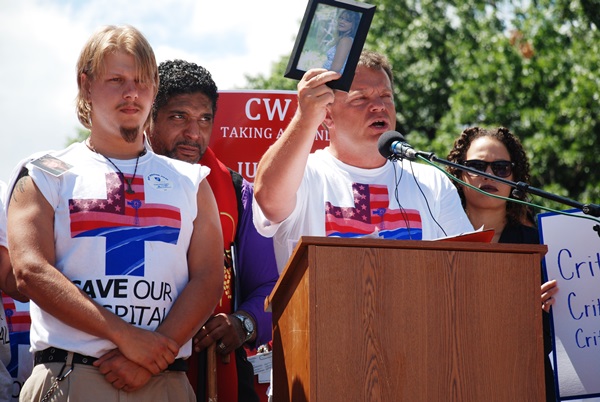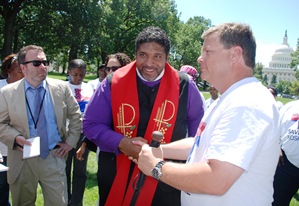 |
| Adam O’Neal, Republican mayor of Belhaven, NC, holds up a picture of Portia Gibbs, who at 48 died from a heart attack while waiting for an airlift to a hospital in Norfolk, VA. The hospital 25 minutes from her house closed just a week before. Gibbs’ son Justin (left), and Moral Monday movement leader Rev. William Barber II (center), joined O’Neal in Washington, DC to urge Medicaid expansion, which they say could have saved their local hospital and Portia Gibbs’ life. |
Adam O’Neal, the Republican mayor of Belhaven, NC (pop. 1,688), recently completed a nearly 300-mile walk to the nation’s capital championing a cause that most in his party wouldn’t dare support publicly.
He knew he had to do something when the only hospital within an hour’s drive of O’Neal’s rural eastern North Carolina town closed July 1.Vidant Health, Inc., the non-profit that used to own the now-defunct Vidant Pungo Hospital, cited financial reasons for shuttering the 49-bed facility.
O’Neal doesn’t mince words when he talks about the morality of Vidant Health’s decision (he says the company made a $109 million profit in 2013), but he also blames the conservative North Carolina legislature’s decision to reject Medicaid expansion.
“We know firsthand that people are going to pass away,” O’Neal told supporters at a rally on Capitol Hill.
He’s talking about Portia Gibbs.
 |
| Belhaven, NC Republican Mayor Adam O’Neal, right, and North Carolina NAACP President Rev. William Barber, center, have teamed up to bring attention to the health care crisis in rural America. |
On July 7, Gibbs, 48, suffered a heart attack. She died while waiting over an hour for a helicopter to arrive from Raleigh to airlift her to a hospital in Norfolk, VA. O’Neal, and Gibbs’ family, say she might have survived if the nearest emergency room was only 25 minutes away, like it was just a week before.
O’Neal carried a photo of Gibbs on his two-week, 273-mile trek to Capitol Hill.
“Ladies like Portia Gibbs are dying all over this country right now,” said O’Neal. “You don’t hear anything about it. It’s not even on the local news. Nobody even knows. But the fact is it’s going on.”
The push to preserve rural emergency health services has brought Rev. William Barber II, president of the North Carolina NAACP, into the fight. The charismatic leader of the Moral Monday movement stood side-by-side with O’Neal as they called on Washington to find a solution to Belhaven’s crisis.
“Some stuff is not about party, it’s about principle,” said Barber, who calls himself an Independent. “It’s about what is moral versus what is immoral.”
More rural hospitals have closed in the last year than in the past 15 combined, according to data compiled by the National Rural Health Association. Under the new federal healthcare law, hospitals that cover a high level of uninsured patients are seeing less federal dollars. The law was supposed to greatly expand health coverage to alleviate that problem, but in North Carolina and 23 other states that rejected Medicaid expansion, many remain uninsured.
“With a small rural hospital like ours, we need all the revenues we can get,” said O’Neal. “There are a lot people who don’t have coverage. By having coverage, the hospitals do better. In the states where they accepted Medicaid expansion, the hospitals are doing a lot better.”
As O’Neal left the rally, he was still hoping the trip would yield a meeting with U.S. Attorney General Eric Holder. He also wants a bill to be introduced to prevent what happened in Belhaven from happening anywhere else.
“We will not quit. We’re not done. This is just the start,” said O’Neal. “We will take whatever measures we’ve got to take to get that hospital back up, because people are dying.”